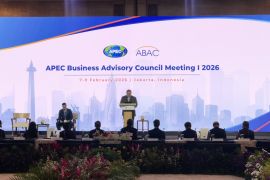The APEC region is on the frontlines for meeting this challenge since member economies are among the first and worst affected by the pandemic. A crisis of unprecedented severity calls for a response of unprecedented scaleJakarta (ANTARA) - The health and economic crisis caused by the COVID-19 pandemic afflicted over two million people globally, with 40 percent from the APEC region, according to a new policy brief by the APEC Policy Support Unit.
The policy brief, titled "APEC in the Epicentre of COVID-19", breaks down the vast and unparalleled impact of the pandemic on the livelihoods of people and small businesses that constitute 97 percent of all firms in the region.
The APEC region’s growth is projected to decline by 2.7 percent this year, from 3.6 percent in 2019, thereby being the most significant drop since the near-zero growth rate recorded in 2009 during the global financial crisis.
The reduction in growth translates to an estimated output loss of US$2.1 trillion due to the economic fallout from the pandemic, and it was compounded by an additional 23 million people becoming unemployed in 2020, the APEC Policy Support Unit noted in a written statement received here on Tuesday.
"The APEC region is on the frontlines for meeting this challenge since member economies are among the first and worst affected by the pandemic. A crisis of unprecedented severity calls for a response of unprecedented scale," APEC Secretariat Executive Director Rebecca Sta Maria emphasized.
The policy brief projects an economic rebound in 2021, with the APEC region anticipated to grow by 6.3 percent, higher than the estimated global economic growth of 5.8 percent.
"As hopeful as it appears, the rebound is conditional on the effectiveness of members’ containment mechanisms to avoid a further wave of the pandemic later this year," APEC Policy Support Unit Director Denis Hew remarked.
The unprecedented shock to the global economy necessitates a well-targeted and coordinated regional response towards socioeconomic recovery, including greater support for healthcare systems and increased social protection.
The APEC region has an average of 4.1 hospital beds, 1.9 physicians, and 3.9 nurses or midwives per one thousand people. Despite an improvement in these figures since the SARS outbreak in 2003, the current capacity of health systems is insufficient, taking into account the significantly higher infection rates and the uncertainty over the span of time that the COVID-19 pandemic will last.
All 21 APEC member economies are rolling out significant and targeted fiscal measures, ranging from one percent to 20 percent of the gross domestic product to tackle the impact of COVID-19, including assistance for the unemployed and small- and medium-sized enterprises.
"Member economies quickly rose to the challenge by introducing fiscal and monetary measures. The focus now is for members to come together for coordinated multilateral cooperation to support our people and small businesses," Sta Maria noted.
"Only by working together will we be better equipped to weather this pandemic and fast track our recovery," she affirmed.
Regional and international organizations, such as the APEC, have a key role to play in ensuring that members continue to exchange relevant public health information, including updates on containment measures, and the development of testing kits, treatments, and vaccines.
Regional cooperation can likewise contribute to boosting healthcare access and capacity among member economies.
The policy brief also suggests that APEC members should work to ensure a continuous supply of medical goods and food. It encompasses eliminating trade-restrictive measures on essential goods to help with the response to the crisis and eventual recovery.
Related news: Ministry projects COVID-19 to spike unemployment by five million
Related news: At least nine hotels closed in SE Sulawesi due to COVID-19 outbreak
EDITED BY INE
Reporter: Yuni Arisandy Sinaga
Editor: Fardah Assegaf
Copyright © ANTARA 2020












